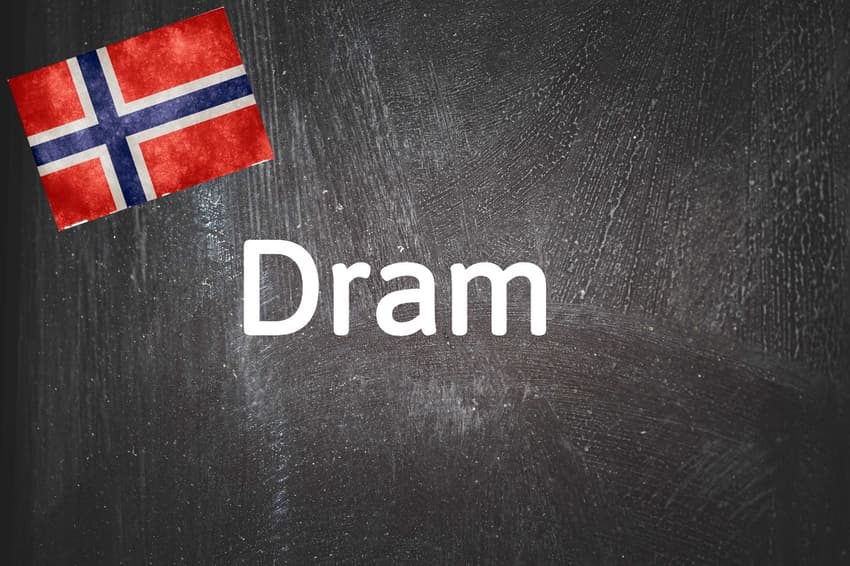Norwegian word of the day: Dram

The Norwegian word for an after-dinner tipple will be familiar to Scottish readers, with Scots and Norwegians sharing quite a few words.
What does dram mean?
A dram in Norwegian is a small glass of spirit, normally aquavit. Typically it’s offered as an after-dinner tipple to help ease the digestion of a particularly big or rich meal.
Scottish readers may be more than familiar with this word, as dram in English means a whiskey.
The word can be traced all the way back to Ancient Greece, and the word Drakhme used in reference to coins. The word appears in Old English (Dragme) through its translation into Latin (Dragma). These words were used to refer to the weight of something.
The original use of the word dram was as a term for an apothecaries’ weight, usually agreed to be one-eighth of an ounce. This equates to between 25 and 35 millilitres of a drink. Although if someone you visit offers you a dram, they could be referring to a drink in general.
Why do I need to know this?
It’s one of several examples of a word in Norwegian that also exists in Scotland or the Scots language. Several Scots words are derived from Old Norse, such as bairn (child), midden (dump), muckle (large), braw (bra in Norwegian – meaning good) and even kilt.
Some words like barn (child in Norwegian) sound very similar to their Norwegian counterparts. Meanwhile, the way some English words are pronounced by those from Scotland, like out (ooot) and house (hoose), sound a lot like the corresponding words (ut and hus) in Norwegian.
This should come as no surprise, though, as Scotland and Norway share historical links dating back to Viking times. So, through years of trading (and plenty of raiding) over centuries, it was perhaps expected that there would be a bit of crossover between the two languages.
A heavily Scandinavian presence in the UK in centuries gone led to a mixing of Old Norse and Old English, resulting in shared words and pronunciations that still exist in English, Scottish and Norwegian today.
Comments
See Also
What does dram mean?
A dram in Norwegian is a small glass of spirit, normally aquavit. Typically it’s offered as an after-dinner tipple to help ease the digestion of a particularly big or rich meal.
Scottish readers may be more than familiar with this word, as dram in English means a whiskey.
The word can be traced all the way back to Ancient Greece, and the word Drakhme used in reference to coins. The word appears in Old English (Dragme) through its translation into Latin (Dragma). These words were used to refer to the weight of something.
The original use of the word dram was as a term for an apothecaries’ weight, usually agreed to be one-eighth of an ounce. This equates to between 25 and 35 millilitres of a drink. Although if someone you visit offers you a dram, they could be referring to a drink in general.
Why do I need to know this?
It’s one of several examples of a word in Norwegian that also exists in Scotland or the Scots language. Several Scots words are derived from Old Norse, such as bairn (child), midden (dump), muckle (large), braw (bra in Norwegian – meaning good) and even kilt.
Some words like barn (child in Norwegian) sound very similar to their Norwegian counterparts. Meanwhile, the way some English words are pronounced by those from Scotland, like out (ooot) and house (hoose), sound a lot like the corresponding words (ut and hus) in Norwegian.
This should come as no surprise, though, as Scotland and Norway share historical links dating back to Viking times. So, through years of trading (and plenty of raiding) over centuries, it was perhaps expected that there would be a bit of crossover between the two languages.
A heavily Scandinavian presence in the UK in centuries gone led to a mixing of Old Norse and Old English, resulting in shared words and pronunciations that still exist in English, Scottish and Norwegian today.
Join the conversation in our comments section below. Share your own views and experience and if you have a question or suggestion for our journalists then email us at [email protected].
Please keep comments civil, constructive and on topic – and make sure to read our terms of use before getting involved.
Please log in here to leave a comment.